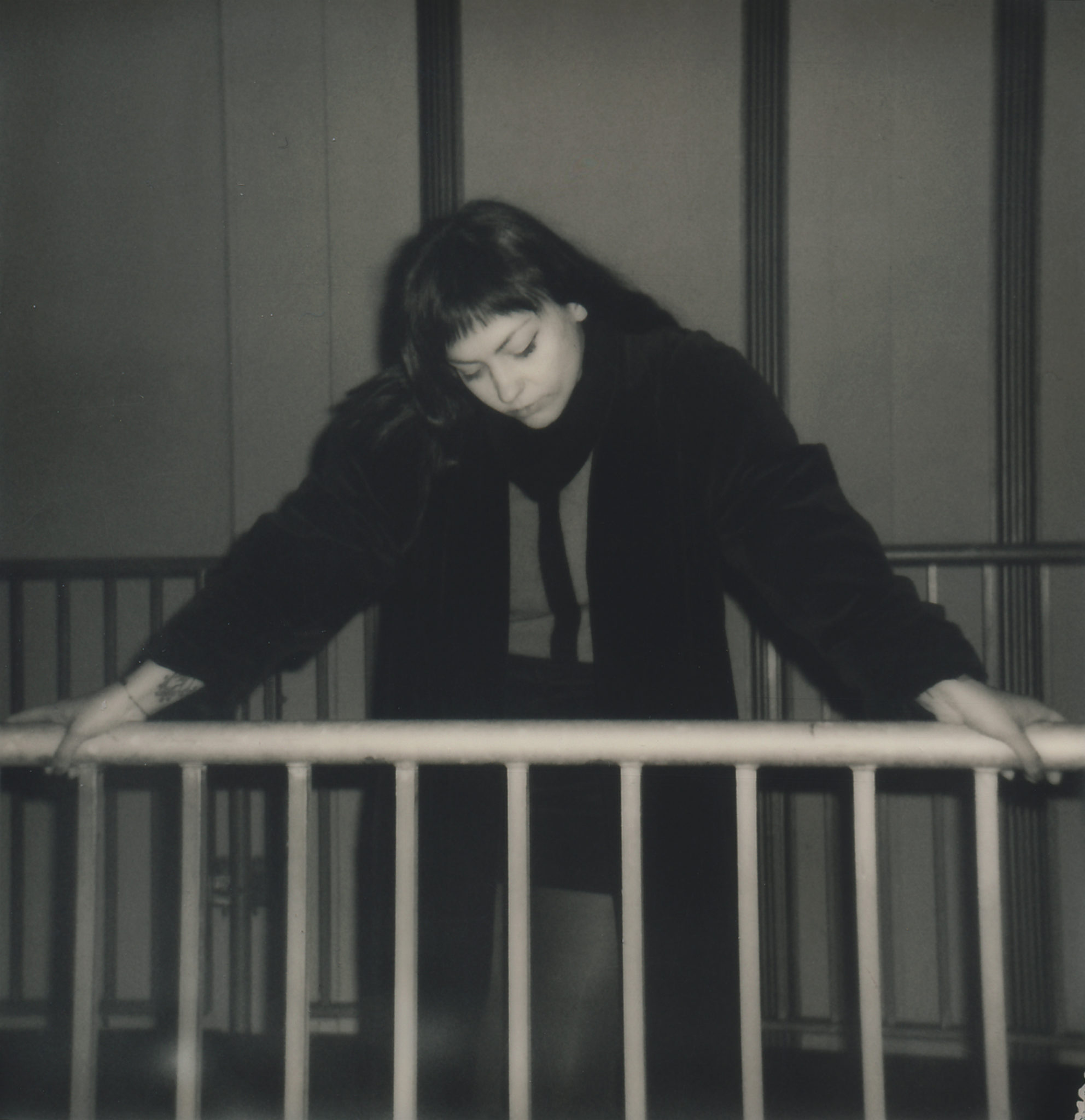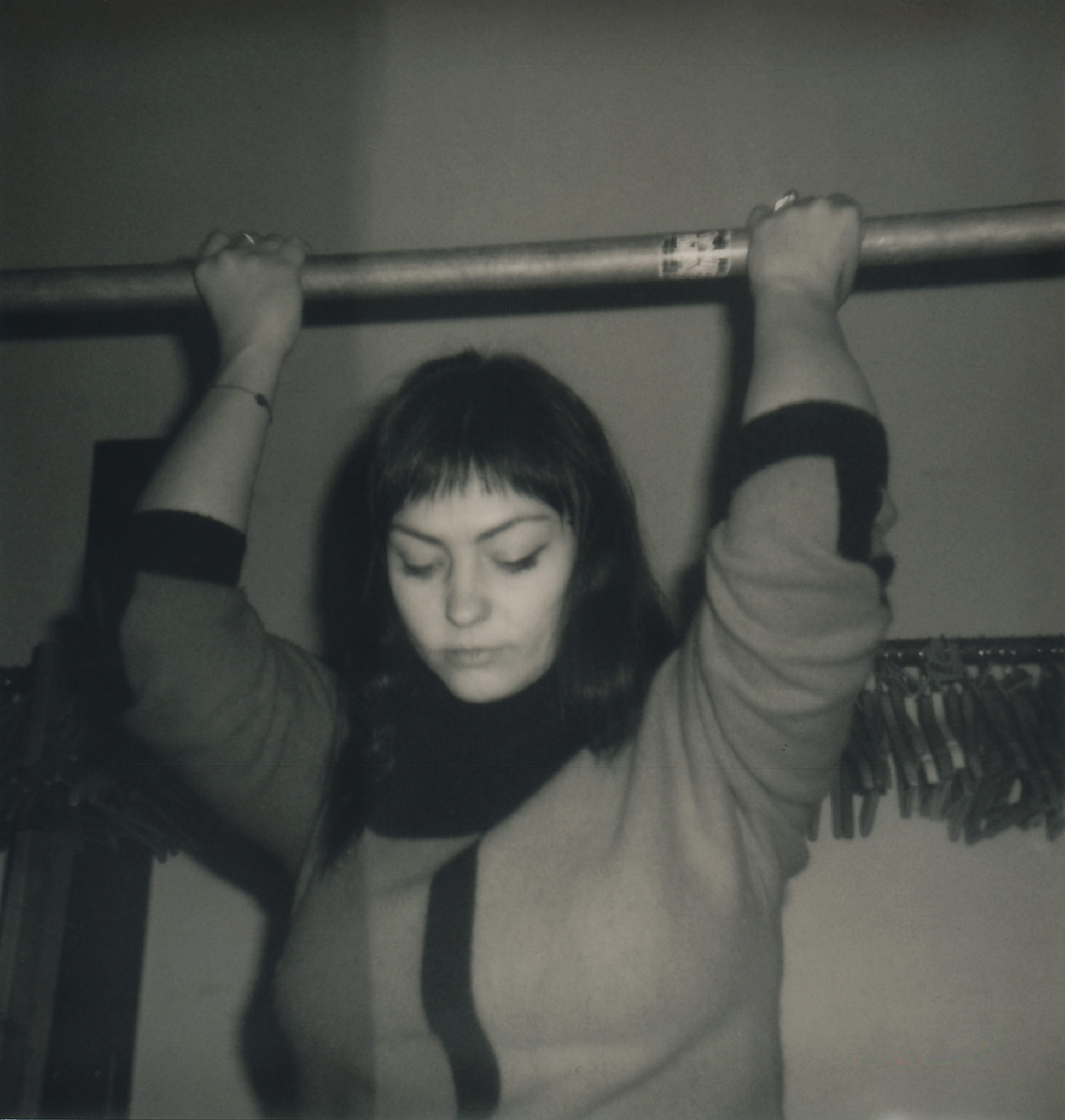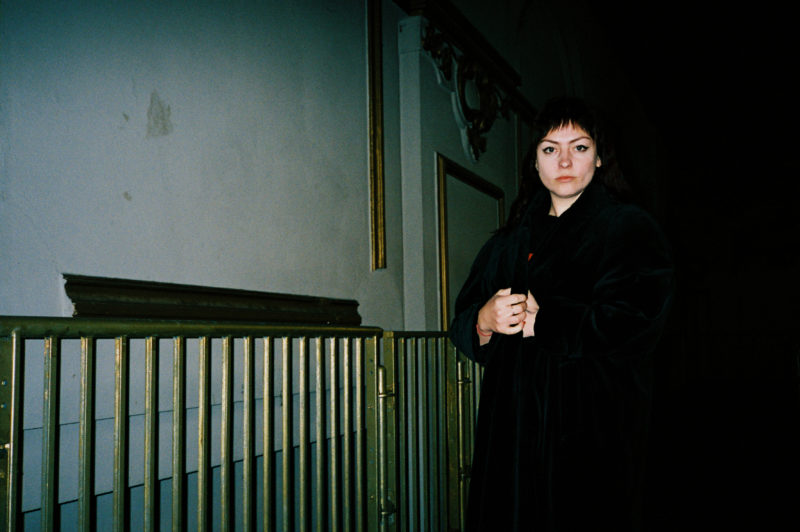It is a rather representative moment for Angel Olsen‘s appeal when, amidst her set at Hamburg’s Gruenspan embarking on her All Mirrors-tour, Olsen announces a song with the words: “This song is about me. It’s about liking yourself more than someone else.” She accompanies it with one of her enigmatic stage-smiles. And although her songs are far from being selfish or self-sufficiant, it’s true what she says: In many ways, Angel Olsen is more herself now than she’s ever been and less of the story she feared to become; the image she was on the verge of turning into. But like almost every sort of growth, that’s been a quite painful process.
I meet her earlier that day on what was one of the rare sunny ones in Hamburg – something we both only witness through the narrow backstage windows of Gruenspan. The soundcheck is still on in the back. Olsen‘s brought a full band and two string musicians with her on this tour. A party of seven people, playing sold out shows in places like this with a capacity of 1000 people. Few months earlier, Sharon van Etten played the same stage. That’s quite something for Olsen, the former indie folk artist who earned first merits around 10 years ago as a background singer for Bonnie ‘Prince’ Billy.

It was with her appearance on Quail & Dumplings that I originally fell for Olsen‘s voice and expression. Something that can both carry huge, theatrical rock songs and seem painfully fragile in the next moment. A spectrum that’s never been presented more beautifully than on All Mirrors. When was it that she discovered that she really had something special there to work with?
“Honestly, the feedback from people who attended the Bonnie ‘Prince’ Billy shows back then was really cool and unexpected. I was just trying to sing my best but also in a way that would make him proud and fit with his music. Strange Cacti also came out around that time and my manager started booking all those gigs along the east coast and they almost all sold out immediately. So being able to play my own music in front of all those people – that was a moment where I realized that, yeah, maybe I don’t have to be a backup-singer all the time.”
Fast forward to All Mirrors: A giant of an album that I described sounding like a heart-broken Edith Piaf jamming with Scott Matthew in Nashville. It was produced by John Congleton, one of the best and most unique sounding producers around, with whom she also worked on my favourite record of hers, Burn Your Fire For No Witness. How important was he for how the album turned out?
“I don’t think I would have made the record the way it turned out without him. For the first time I didn’t have everything planned out in advance. What I knew was that the songs I had didn’t really require a rock’n’roll feel. So I really had to rethink this time and reimagine how to approach these songs to make them sound the strongest without this rock’n’roll-feel about them. And I think talking to John about sourcing people to be on it kind of gave me an idea of how many arrangers could be a part of it.”
As a result, John Congleton as the producer, Jherek Bischoff taking care of string- and Ben Babbitt of general arrangements co-created a record that sprawls in every second. It’s the most epic Olsen has sounded so far but at its core still consists of solitary folk songs.
Angel Olsen carefully, slowly and steadily developed her style from folk into indie rock regions, crafting a strong aesthetic of her own and thus growing her fanbase over the past years. It all seemingly culminated in 2016s successful My Woman. But, as it is so often the case in this business: Olsen seemed to be at her peak, but was feeling very low. She speaks openly about these times now.
“Around the touring of My Woman I felt like I hadn’t any control over my career and I didn’t know what was happening. I have a thyroid disease which makes me gain and loose weight constantly. I was taking my meds but way more than I should have. Not eating food, drinking a lot. Still everyone was like: ‘You look great!’ (she ironically imitates the typical paternalistic knee-touching) – that doesn’t help! I felt very isolated. But I can’t look back and dwell and fell sorry for myself. Because that does nothing. I think I’m in a better place in my relationships now and in knowing how my business works. Being confident enough to confront people. I just had to grow up. This tour is probably as busy as the last one but the difference is that I’m around good people and feeling confident about talking with them about problems.”

Does that mean that you also started to separate the person Angel Olsen a bit more from the artist Angel Olsen…?
“I make this kind of music and put it out there. But it’s just a fraction of the person that I am. Even if it is a very close record to me. It’s not all of who I am. It’s funny sometimes – to think of musicians taking themselves so seriously...”
“All Mirrors is a very personal album. But I’m still gonna have fun with it obviously. I like being creative when it comes to making visuals and videos, to get into the performance almost theatrically. But I don’t want to get to the point where I can’t interact with an audience because I’m so much of a character. I’ve seen it in friends who turned into the most unrecognizable caricatures of themselves. My only hope is that you can get past that as a musician when you realize: You don’t have to do it at all.”
Seeing Angel Olsen live mirrors that approach. She can turn from distant, cool rock star to goofy within seconds when she exchanges jokes with her band. Her laughter being more like a giggle through which the whole theatrical, grand gesture evaporates into sheer humanity. She can take a room with just a smile and a song. But she can also leave it arms length whenever she needs to.
“Back when I was touring My Woman it was all toppling down on me. At the same time my record was doing very well and I was having fun playing the shows – I looked good, it sounded great. But I didn’t connect with it. You know what I mean?”
At this point Olsen gives me one of those looks that is hard to decipher. A look that’s probably just serving the cause for HER to decipher MY intentions. Well, I intended to also throw something personal into this anyway.
There’s power in both masculinity and feminity
Lately, not only All Mirrors but especially some songs on this record made me reflect on toxic masculinity and what that means for and in my life. Especially for my own potentially abusive behaviour. I’m afraid I’ve also got the tendency to belittle people. Ironically often not out of superior but out of inferior feelings. The way I try to find for myself there is to deliberately think more in supportive than in competitive categories. Because that’s what society still tells us in many parts: it rewards the belittling, the overpowering instead of the empowering. So: How far can we really get with equality within those kind of structures?
“I don’t really have an answer for that. Just this: In Lark there’s this part where I sing ‘Baby I was there and I held him/I was there and put it all on me’. That’s about a time when I was literally holding a partner in my arms and he was crying, asking me to forgive him. But on the outside – in the world, that is a man’s world – he had to be different and fill a role. And by filling this role he also felt that he had to behave negative towards me in front of other people. Belittle me in front of people. Being really condescending, you know? I think it’s pretty transparent that that’s an inferior complex. To think that you have to act that way because you’re not enough. So what you do as a partner, what I did, is that you go into the cycle where you forgive the person. Because you know that his or her behaviour is coming from a deep, sad place. But that only keeps the cycle going. How to break the cycle? That’s up to you.”
“All I know is: There’s power in both masculinity and feminity. There’s nothing to be ashamed of if you’re upset or crying or hurt. But I get that the way the world works is still very different to that. And I do believe that it is hard to balance.”
When Olsen speaks about breaking bonds, walking away from what damages you, she doesn’t seem bitter. Her glimpse drifts though, as she’s talking. The hurt is palpable. Like Lark screams from the top of its lungs: “Hiding out inside my head, it’s me again, it’s no surprise I’m on my own now/Every time I turn to you, I see the past/It’s all that lasts and all I know how”
“I never thought I was a person who needed solitude until I lived alone. And then I loved it so much. I have a cat and I bought this beautiful house. I remember asking myself: Why do I buy this house, I don’t have a partner or anything. But then again, now I have a great house and it’s my place. For the amount of travelling that I’m doing it’s my present to myself. Without anyone planning my year ahead. It’s gotten to the point that I can’t really imagine living there with a partner. Maybe he can live across the street.”

She accompanies that last sentence with one of her ironic smiles. And it’s true that experiencing Angel Olsen‘s music means not to dwell in pain but to be aware of that pain while glimpsing at the sun; to embrace solitude. It’s not like her music turned into carefree as it grew bigger and more confident on All Mirrors. There are still things in it that are bigger than the usual heartbreak. What’s changed over the years is that the trauma and sadness that always shines through Olsen‘s lyrics has a special place now in her life.
“As I’ve gotten older I keep my nostalgia to myself. I have a place for it and I’m fine with it. The experiences that I’ve had that inspired me to write these songs: I’m happy for them. Because now I am in a more calm place and I’ve learned something about myself.
If I can visit my nostalgia in song, it’s a reminder of the strength that I’ve had; the things I endured that made me strong. I’m not revisiting to cry about it. I remember when all that used to matter so much to me, when there was no other reality outside of one experience or the single opinion of one person. But the moment I closed that door and moved on, so many other more doors opened.”
“Sometimes, the way that you’re choosing to see things is what keeps you hindered, what keeps you there.”
In the end, that’s the point of it. The images we create, they are just that: images. We all choose how we perceive them. Hence, we are all free to change them. It’s still to see where this process of reflecting on how to reflect will lead Angel Olsen. But one should be eager to follow her path. Because you might just find yourself grow along with her.
“Took a while, but I made it through/If I could show you the hell I’d been to/Lost the light, but there the sun was shining”
all photos by Louisa Zimmer
Angel Olsen will release a second edition of All Mirrors this fall. It will contain very differing, original versions of the album’s songs but also some that didn’t make it to All Mirrors.




